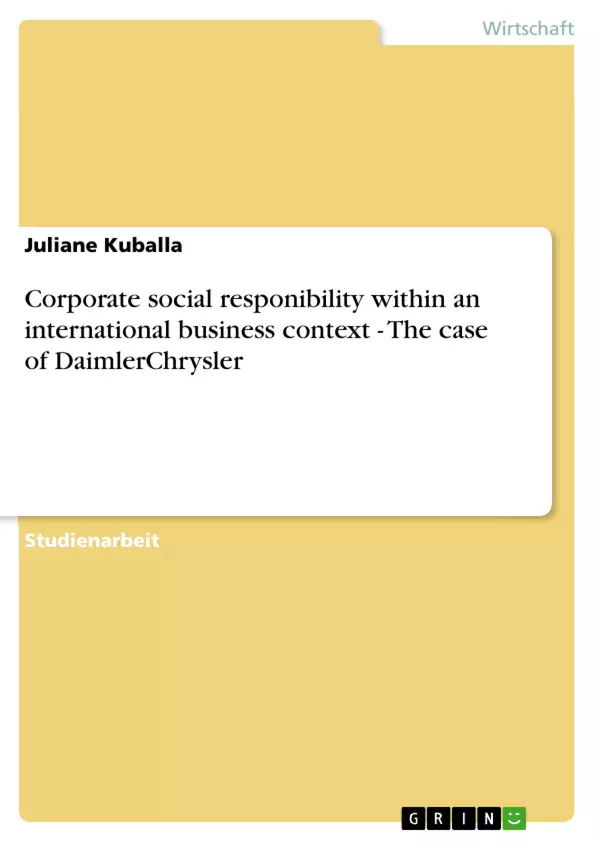In the first section of this academic assignment different aspects that must be considered for the creation of reports that force multinational businesses for real accountability are identified. Moreover the importance of the development of common reporting standards is pointed out. In this context especially the most important principles of the reporting guidelines published by the GRI are highlighted. The GRI guidelines were chosen as DaimlerChrysler, the multinational company which is considered in the second section of this assignment, gears its reporting issues related to sustainability to them. Moreover benefits and limitations of social and environmental auditing a multinational company will recognise are stated. Finally this assignment examines what kind of ethical, social and environmental information DaimlerChrysler discloses in its various reports and which facts are silenced or euphemised to provide a better picture to the public.
Inhaltsverzeichnis
- Introduction
- Effectiveness of social and environmental accounting
- Stakeholder approach as a precondition for effective SEA
- Development of social and environmental reporting standards
- Benefits and limitations of social and environmental reporting
- Examination of DaimlerChrysler's reports
- Examination of DaimlerChrysler's reporting about environmental issues
- Examination of DaimlerChrysler's reporting on social and ethical issues
- DaimlerChrysler's cooperation with an armaments manufacturer
- Equal opportunity management
Zielsetzung und Themenschwerpunkte
Diese Arbeit untersucht die soziale Verantwortung von Unternehmen im internationalen Kontext am Beispiel von DaimlerChrysler. Sie analysiert die Wirksamkeit der sozialen und ökologischen Rechnungslegung (SEA) und die Bedeutung des Stakeholder-Ansatzes für eine effektive SEA. Zudem werden die Entwicklung von Standards für die soziale und ökologische Berichterstattung sowie die Vorteile und Grenzen der Berichterstattung in diesem Bereich beleuchtet. Schließlich wird untersucht, welche Informationen DaimlerChrysler in seinen Berichten über ethische, soziale und ökologische Aspekte offenlegt und welche Fakten verschwiegen oder beschönigt werden.
- Die Wirksamkeit der sozialen und ökologischen Rechnungslegung (SEA)
- Die Bedeutung des Stakeholder-Ansatzes für eine effektive SEA
- Die Entwicklung von Standards für die soziale und ökologische Berichterstattung
- Die Vorteile und Grenzen der sozialen und ökologischen Berichterstattung
- Die Offenlegung von Informationen über ethische, soziale und ökologische Aspekte durch DaimlerChrysler
Zusammenfassung der Kapitel
- Introduction: Dieses Kapitel stellt die Relevanz des Themas der sozialen Verantwortung von Unternehmen im internationalen Kontext dar und beleuchtet die Entwicklung des Themas im 20. Jahrhundert. Es erläutert, warum Unternehmen zunehmend Transparenz in Bezug auf ihre sozialen und ökologischen Auswirkungen zeigen müssen.
- Effectiveness of social and environmental accounting: Dieses Kapitel untersucht die Wirksamkeit der sozialen und ökologischen Rechnungslegung (SEA) als Instrument, um Unternehmen zur Verantwortung für ihr Handeln zu verpflichten. Es diskutiert die Möglichkeiten, die Unternehmen haben, negative Auswirkungen ihrer Aktivitäten zu verschleiern und die Notwendigkeit unabhängiger Überprüfung von SEA-Berichten.
- Stakeholder approach as a precondition for effective SEA: Dieses Kapitel betont die Bedeutung des Stakeholder-Ansatzes für eine effektive SEA. Es definiert verschiedene Stakeholder-Gruppen und erläutert, warum deren aktives Engagement für glaubwürdige und vollständige SEA-Berichte unerlässlich ist.
Schlüsselwörter
Die Arbeit befasst sich mit den Themen der sozialen Verantwortung von Unternehmen, der sozialen und ökologischen Rechnungslegung (SEA), dem Stakeholder-Ansatz, der Entwicklung von Reporting-Standards und der Offenlegung von Informationen über ethische, soziale und ökologische Aspekte. Im Kontext des Case-Studies wird insbesondere der Fokus auf DaimlerChrysler und dessen Berichterstattungspraxis gelegt.
Häufig gestellte Fragen
Was ist das Hauptthema dieser Untersuchung?
Die Arbeit untersucht Corporate Social Responsibility (CSR) im internationalen Kontext am Fallbeispiel von DaimlerChrysler.
Welche Reporting-Standards werden in der Arbeit hervorgehoben?
Besonders die Richtlinien der Global Reporting Initiative (GRI) werden als wichtigste Prinzipien für die Nachhaltigkeitsberichterstattung genannt.
Was ist die Voraussetzung für eine effektive ökologische Rechnungslegung (SEA)?
Der Stakeholder-Ansatz wird als notwendige Bedingung für eine glaubwürdige und vollständige soziale und ökologische Rechnungslegung angesehen.
Welche kritischen Aspekte werden bei DaimlerChrysler analysiert?
Die Arbeit untersucht unter anderem die Kooperation mit Rüstungsherstellern sowie das Management von Chancengleichheit.
Was sind die Grenzen der sozialen und ökologischen Berichterstattung?
Unternehmen können negative Auswirkungen verschleiern; daher ist eine unabhängige Überprüfung der Berichte für echte Rechenschaftspflicht unerlässlich.
- Quote paper
- Juliane Kuballa (Author), 2006, Corporate social responibility within an international business context - The case of DaimlerChrysler, Munich, GRIN Verlag, https://www.grin.com/document/66941



